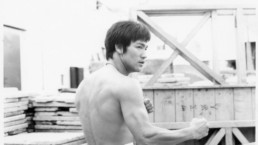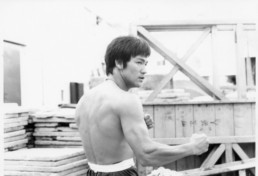‘Be Water’ Review: Bruce Lee Triumphed Over Racism and Transcended
This is a custom heading element.
Quick Take: Be Water succeeds in telling the story of the man who would be immortalized as philosopher king, Kung Fu master, and Hollywood legend by showing his biggest battle: a lifelong fight for racial identity and acceptance.
When we think of Bruce Lee, the first images that likely come to mind are of the martial artist in a crane-posed manner, single-handedly pulverizing an entire room full of hapless combatants. Perhaps you’re picturing Lee decimate a fleet of enemies in his iconic yellow jumpsuit from Game of Death. Or maybe it’s just a general abstract collection of Bhuddist-minded thoughts, illustrating how an enlightened guru once lived among us mere mortals.
While these images are constructive in that they inspire wonder and awe in us, there’s also something unfortunate that the mythologizing of a person also does, which is to erase the human at the heart of these myths – and subsequently, invalidating the struggles that they had in their human form.
Be Water succeeds as a documentary in that it focuses on telling the story of Bruce Lee, starting from his childhood and through his upbringing, which we learn was strife with trying to overcome the natural downward pull of systemic racism. Be Water very mindfully takes moments to not only focus on the racially harmful times that Lee faced when he grew up – being born in San Francisco during a time in America where racist stereotypes of Chinese people were not only just embarrassingly present in film and television, but also a short history away after being forced to do manual labor to complete the railroads of today’s America.
It’s unfortunate that now, in 2020, that we still find ourselves to be a nation that’s still fighting for true equality for all of its people. And yet it’s also what makes Be Water so incredibly essential to watch as well. Once Lee accepted to not fight resistance, but to go with it – to be like water – Lee was open to pursuing his wildly ambitious dreams, which were to be both a martial arts master and Hollywood star, in an era where neither had been done before in Western culture. Be Water tells Lee’s story with both his widow, Linda Lee Caldwell, and daughter, Shannon Lee’s contributions, which serve as a majority of the history.
After seeing Be Water, I was moved to see what personal struggles Lee faced that I hadn’t known about, and though I was aware that his life was short-lived, still found myself shocked to see when Lee tragically passed away at the age of 32 – mere weeks before Enter the Dragon, his biggest film ever, would open in Hollywood, and cement his legacy forever. If Bruce Lee was, as he spoke about, a pebble in water, then Be Water is a ripple that tells even more to his story.
ESPN’s Bruce Lee 30 for 30 will be available to stream (with a valid cable login) on WatchESPN after it airs on ESPN. Be Water will be available on WatchESPN for 21 days before moving exclusively to ESPN+.
Ryan Rojas
Ryan is the editorial manager of Cinemacy, which he co-runs with his older sister, Morgan. Ryan is a member of the Hollywood Critics Association. Ryan's favorite films include 2001: A Space Odyssey, The Social Network, and The Master.


